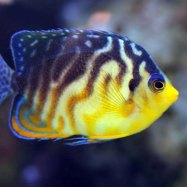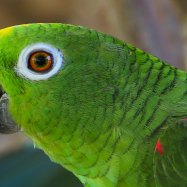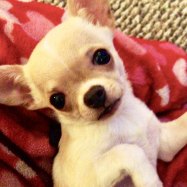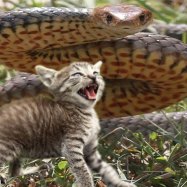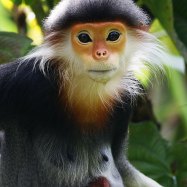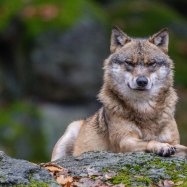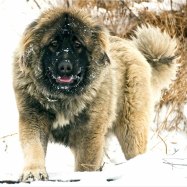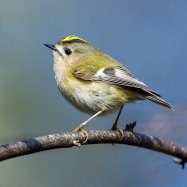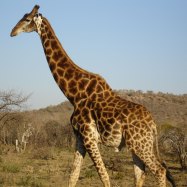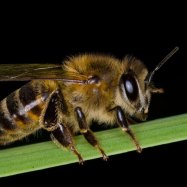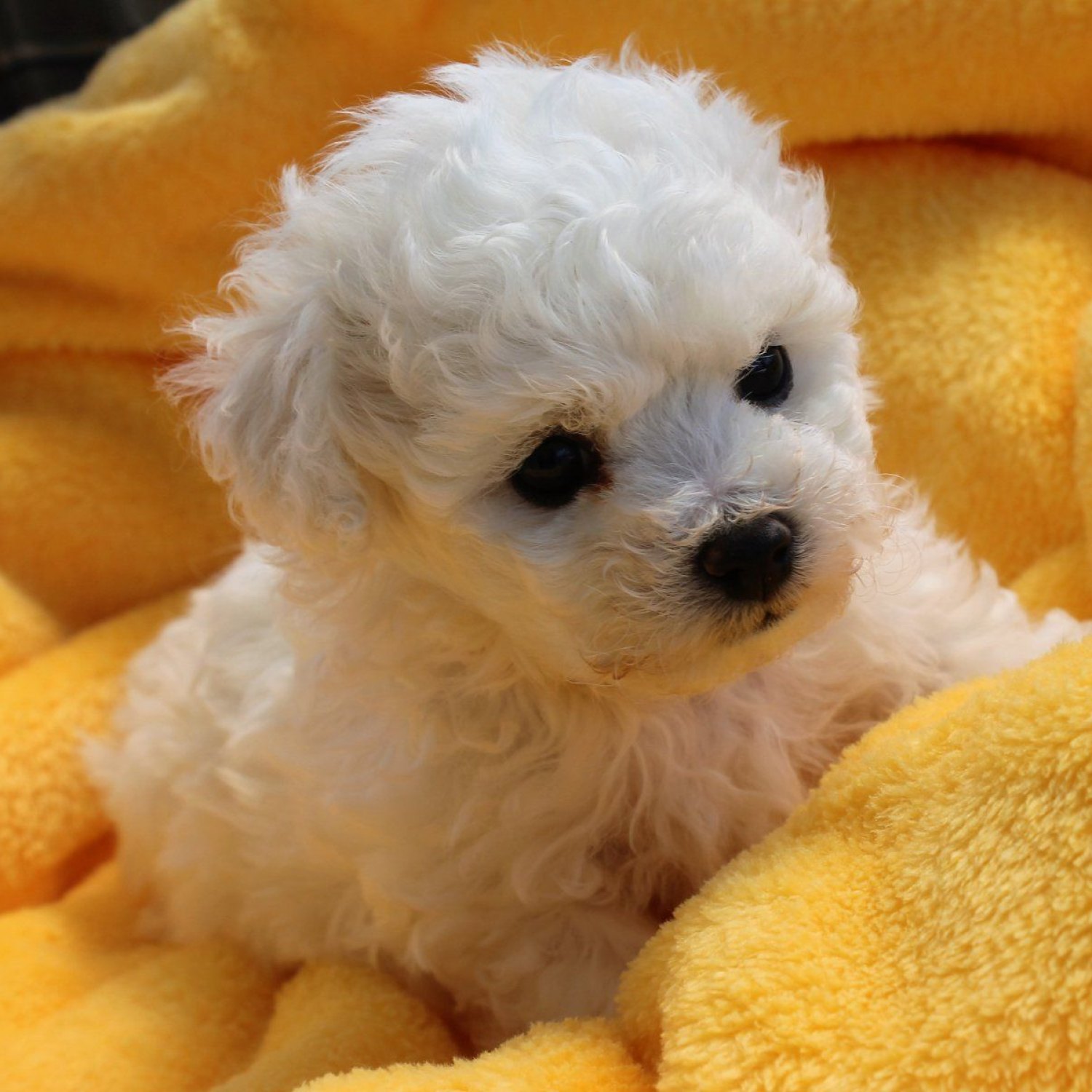
Bichon Frise
9 to 12 inches
Bichon Frise, a popular breed in the Canidae family, is a lovable companion for homes and families. These small and fluffy dogs can grow up to 12 inches and are known for their playful and gentle nature. The Bichon Frise is highly adaptable to different living environments, making them an ideal pet for all kinds of families.
Animal Details Summary:
Common Name: Bichon Frise
Kingdom: Animalia
Habitat: Domesticated
The Bichon Frise: A Small and Fluffy Companion From the Mediterranean
In the world of canines, there are few breeds as beloved and iconic as the Bichon Frise. With its distinctive all-white fluffy coat, perky personality, and compact size, this breed has won the hearts of dog lovers all over the world. But beyond its undeniable cuteness, the Bichon Frise also possesses a rich history and unique characteristics that make it stand out among other dog breeds.A Closer Look at the Bichon Frise
The scientific name for the Bichon Frise is Canis lupus familiaris, a subspecies of the grey wolf, and it belongs to the Animalia kingdom, the Chordata phylum, and the Mammalia class Bichon Frise. As part of the Carnivora order, the Bichon Frise shares a common ancestor with other meat-eating animals such as wolves, lions, and bears.One of the most fascinating things about the Bichon Frise is its origin. The breed is believed to have originated in the Mediterranean, specifically on the island of Tenerife in the Canary Islands. It is thought that the breed descended from Italian water dogs and was developed through crossbreeding with other small curly-coated breeds, such as the Poodle. Over time, Bichon Frise dogs were introduced to Spain and were eventually brought to France, where they became popular among the nobility during the Renaissance period.
A Compact and Fluffy Dog
The Bichon Frise is a small breed, with a height ranging from 9 to 12 inches and a weight of 12 to 18 pounds. Its most striking feature is its all-white fluffy coat, which is soft to the touch and can range from curly to wavy in texture. The coat is double-layered and hypoallergenic, making it an ideal choice for people with allergies.The Bichon Frise has a small, round head with a black nose and expressive dark eyes Bonnethead Shark. Its ears are long and droopy, giving it a somewhat puppy-like appearance. Its body is compact and balanced, with a curly tail that is often carried over its back. As a small dog, the Bichon Frise has a lifespan of 12 to 15 years, making it a long-term and loving companion.
A Domesticated Breed with Worldwide Reach
Unlike other dog breeds that are primarily used for hunting or working purposes, the Bichon Frise is a domesticated breed that has been cultivated for centuries to be a companion animal. This is evident in its cheerful and affectionate nature, making it a popular choice for families and individuals alike.Due to its friendly and easy-going temperament, the Bichon Frise is a favorite breed in many households around the world. They are especially popular in countries such as the United States, Canada, and the United Kingdom, where they are often kept as indoor pets. Their small size and lack of shedding also make them an ideal choice for apartment or condo living.
An Omnivorous Appetite
Unlike other wild members of the canine family, the Bichon Frise has adapted to an omnivorous diet. Wild dogs, such as wolves and foxes, are predominantly carnivorous, but the domesticated nature of the Bichon Frise has allowed it to tolerate and even enjoy a wide range of foods. A balanced diet of high-quality dog food, along with occasional treats such as vegetables and fruits, is essential for keeping this breed healthy and happy.One Big, Happy Family
Despite its small size, the Bichon Frise is a fearless and confident breed. They are known for their playful and energetic nature, making them a joy to have around. They are loyal and devoted to their families, making them excellent companions for children and adults alike. They also get along well with other pets, making them a harmonious addition to any household that already has a furry friend.However, as with any dog breed, proper socialization and training are crucial for a well-behaved and balanced Bichon Frise. They are intelligent and eager to please, making them easy to train with positive reinforcement techniques. Training also provides great mental stimulation for this breed, helping to keep them entertained and happy.
In Conclusion
In summary, the Bichon Frise is a charming and delightful breed that has captured the hearts of dog lovers worldwide. Its origins can be traced back to the Mediterranean, but its popularity knows no bounds, with its presence felt in homes and families around the globe. Its unique characteristics, such as its small size, all-white fluffy coat, and friendly nature, make it a distinct breed among others.If you are considering adding a Bichon Frise to your family, make sure you do your research and find a reputable breeder or adopt from a rescue organization. With proper care and love, your Bichon Frise will surely become a cherished and devoted member of your family.

Bichon Frise
Animal Details Bichon Frise - Scientific Name: Canis lupus familiaris
- Category: Animals B
- Scientific Name: Canis lupus familiaris
- Common Name: Bichon Frise
- Kingdom: Animalia
- Phylum: Chordata
- Class: Mammalia
- Order: Carnivora
- Family: Canidae
- Habitat: Domesticated
- Feeding Method: Omnivorous
- Geographical Distribution: Worldwide
- Country of Origin: Mediterranean
- Location: Homes and families
- Animal Coloration: White
- Body Shape: Small and fluffy
- Length: 9 to 12 inches
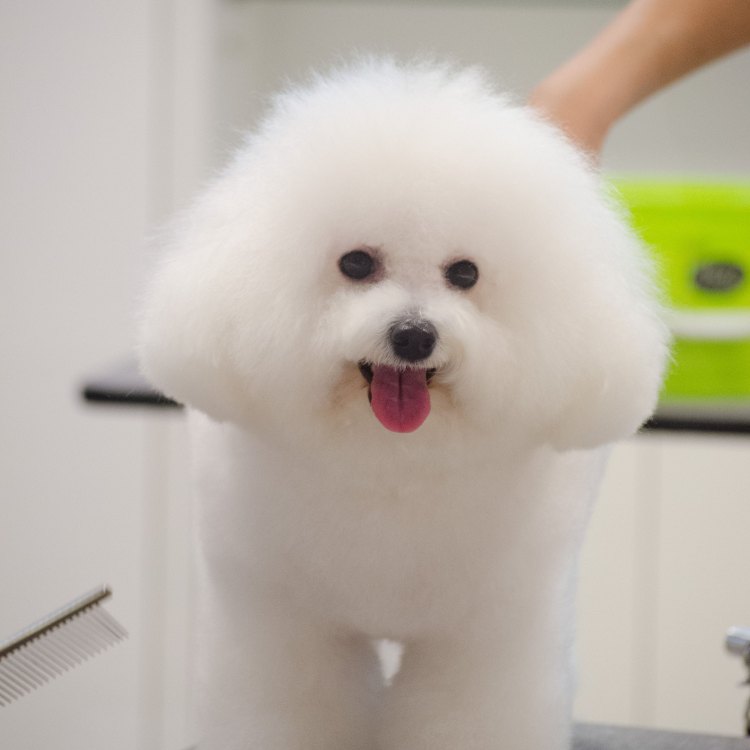
Bichon Frise
- Adult Size: 9 to 11 inches
- Average Lifespan: 12 to 15 years
- Reproduction: Sexual
- Reproductive Behavior: Breeding
- Sound or Call: Barks and howls
- Migration Pattern: Non-migratory
- Social Groups: Pack mentality
- Behavior: Friendly and affectionate
- Threats: None
- Conservation Status: Not applicable
- Impact on Ecosystem: N/A
- Human Use: Companion animal
- Distinctive Features: Curly fur, dark eyes, small size
- Interesting Facts: Bichon Frises are hypoallergenic and have a playful nature.
- Predator: None

Canis lupus familiaris
The Adorable Bichon Frise: A Perfect Companion for Life
In the world of dog breeds, there is one little fluffball that stands out from the rest. With a charming personality and a distinctive appearance, the Bichon Frise has captured the hearts of many. From their curly white fur to their playful nature, there is no denying that this breed is a popular choice among dog lovers. In this article, we will take a closer look at the unique features of the Bichon Frise, its behavior, and its impact on the ecosystem PeaceOfAnimals.Com.The Basics of Bichon Frise
The Bichon Frise is a small breed of dog that originated in the Mediterranean region, specifically in France and Spain. Its name is derived from the French word "bichon," which means small dog, and the Spanish word "frise," which means curly. This petite breed stands at 9 to 11 inches at the shoulder and weighs between 7 to 12 pounds when fully grown, making them the perfect size for a lap dog.An average Bichon Frise has a lifespan of 12 to 15 years, which is longer than most breeds of its size. This means that if you choose to welcome this fluffy companion into your life, you can expect to spend many years of love, joy, and unforgettable memories together.
Reproduction and Social Behavior
The Bichon Frise is a sexual reproducer, meaning that they require a mate to reproduce. Like most dogs, the female Bichon Frise goes through heat cycles and can have puppies at any time of the year. Their reproductive behavior is known as breeding, where a female mates with a male dog to produce offspring.Bichon Frises have a pack mentality, following a hierarchy within their social groups Black Headed Python. This trait dates back to their ancestors, who were used as lap and companion dogs to French nobles. This pack mentality makes the Bichon Frise an ideal family dog as they are known to be friendly, affectionate, and loving towards their owners and other pets. They thrive on human companionship and are happiest when they are surrounded by their loved ones.
Behavior and Unique Features
One of the most distinctive features of the Bichon Frise is its curly white fur, which is soft to the touch. Their fur is hypoallergenic, making them a popular choice for people with allergies. This means that their coat doesn't shed as much as other breeds, and they are less likely to trigger an allergic reaction. However, they do require regular grooming to keep their fur free of mats and tangles.Another unique feature of the Bichon Frise is its dark, expressive eyes. These big, round eyes are often described as "merry" and add to the overall charm of this breed. They have a black nose and lips that contrast nicely with their white fur, giving them an adorably cute appearance.
Bichon Frises are known for their playful and curious nature, making them a joy to be around. They are always eager to please their owners and excel at activities like agility training and dog shows. However, they can also be prone to separation anxiety, so it's essential to give them proper mental and physical stimulation to keep them happy and healthy.
Threats and Conservation Status
One of the best things about the Bichon Frise is that it has no natural predators, making it a safe and secure breed. They can live both in urban and rural environments, and their small size makes them less vulnerable to potential dangers. Unlike some wild animals, the Bichon Frise does not pose a threat to other species, making them a harmonious addition to any ecosystem.As a domestic dog breed, there is no conservation status for the Bichon Frise. However, responsible breeding and pet ownership are essential to maintain the health and well-being of this breed. It's crucial to research reputable breeders and provide adequate care for these dogs to ensure that they lead happy and fulfilling lives.
Human Use
The Bichon Frise is primarily used as a companion animal, known for its friendly and loving nature. Their small size and hypoallergenic fur make them a popular choice for people living in small spaces or with allergies. They are also a common therapy dog breed, often trained to provide emotional support to people in hospitals, schools, and nursing homes.Despite their small size, Bichon Frises also make great watchdogs as they are alert and will often bark to alert their owners of any potential danger. However, they are not aggressive by nature and will rarely show any signs of aggression even towards strangers.
Interesting Facts About Bichon Frises
Aside from their unique features and charming personality, there are a few interesting facts about Bichon Frises that you may not know. Firstly, they are known for their love of water and are great swimmers. This is unusual for a breed that was originally used as a lap dog!Secondly, Bichon Frises are highly adaptable and can thrive in different living situations. Whether you live in a small apartment or a big house, as long as they have plenty of love and attention, they will be happy and content. Lastly, Bichon Frises have a tendency to howl instead of barking, which is a unique and amusing trait for this breed.
The Bichon Frise's Impact on the Ecosystem
The Bichon Frise has a minimal impact on the ecosystem as it is a domesticated breed and does not exist in the wild. Unlike some dog breeds, they do not have a history of being used for hunting or herding, which may have had an impact on the ecosystem. They also do not have any specific diet requirements, making them an environmentally-friendly companion animal.However, it's essential to be responsible pet owners and ensure that their waste is disposed of properly to prevent any harm to the ecosystem. Additionally, spaying or neutering your Bichon Frise can also help control the population of domesticated dogs, which can have a positive impact on the environment.
The Perfect Companion for Life
In conclusion, the Bichon Frise is a lovely breed that has captured the hearts of many with its unique features, friendly nature, and minimal impact on the ecosystem. With a lifespan of 12 to 15 years, this little fluffball can bring a lifetime of joy and love to your home. From families with children to seniors looking for a furry companion, the Bichon Frise is an excellent choice for anyone looking for a loyal, intelligent, and loving dog breed. So, if you're in the market for a new furry friend, consider welcoming a Bichon Frise into your life for a lifetime of happiness.
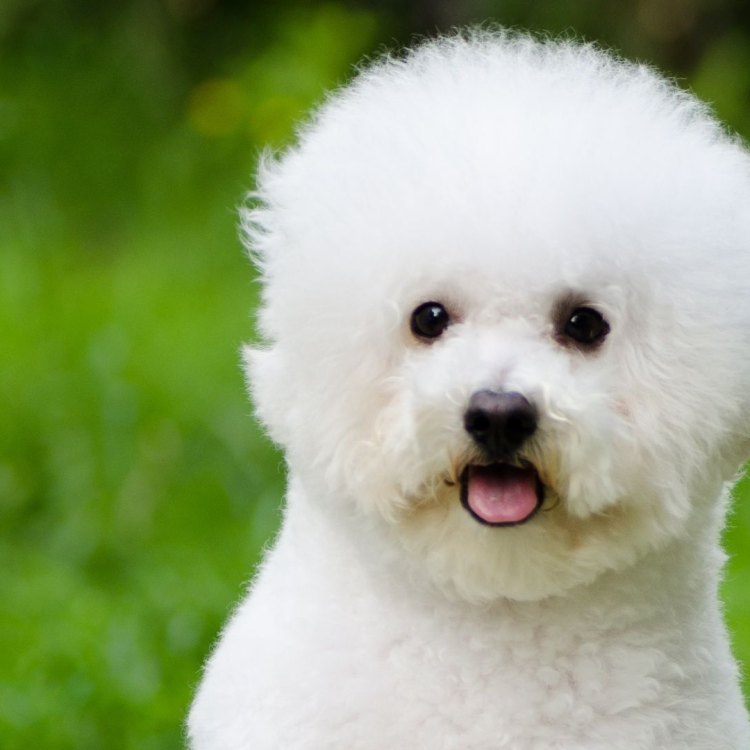
The Bichon Frise: A Small and Fluffy Companion From the Mediterranean
Disclaimer: The content provided is for informational purposes only. We cannot guarantee the accuracy of the information on this page 100%. All information provided here may change without prior notice.

